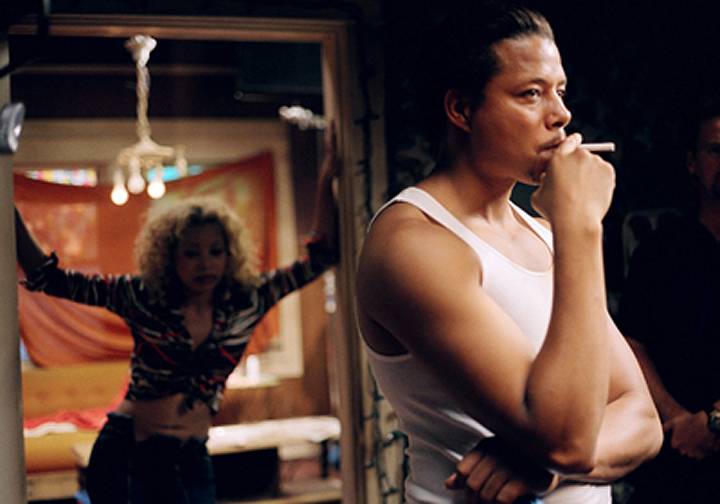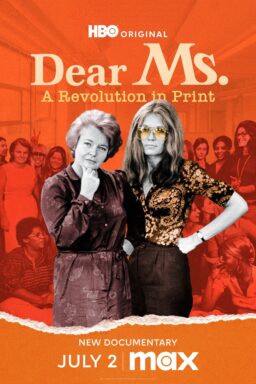Terrence Howard is having a good year. He’s given two performances that are, by general agreement, of Oscar caliber. In “Crash,” which opened in May, he played a TV producer who finds himself in an impossible situation when his wife is assaulted by a white cop; he knows that if he protests, he’ll be charged with resisting arrest, or worse. Currently, in “Hustle & Flow,” he plays a Memphis pimp named Djay who dreams of becoming a rap artist; as he works with new friends to make a demo record, the joy of creation changes the nature of his life. And in the new film “Four Brothers,,” he plays a cop, so this year he’s been on both sides of the law and in the middle.
Howard is handsome in a Billy Dee Williams way, is soft-spoken and calm, and it’s a surprise to see him as a street-smart pimp with a rough Memphis accent. That’s what’s known as acting. Sometimes it takes two or three performances to snap an actor into focus, so that you can see his gift and not simply his work. It happened last year to Jamie Foxx. This year, it’s happening to Terrence Howard.
In a hotel suite in Chicago, we talked a long time. I found myself caught up in his energy; he wasn’t “doing an interview,” but was speaking directly from his heart. Here are some of the things I learned from him:
* “I’ve been at this for 19 years. I’m one year from a pension. This year I got to work with Paul Haggis (“Crash“) and George Wolfe (“Lackawanna Blues,” for HBO) and Darnell Martin (“Their Eyes Were Watching God,” for ABC) and Craig Brewer (“Hustle & Flow“) and John Singleton (director of “Four Brothers,,” producer and financer of “Hustle & Flow“), and I just finished a film with 50 Cent, directed by Jim Sheridan (“In America“). I consider these directors to be my tutors. A director is your acting coach, fine-tuning you until you shine bright enough that everyone can see. Before, I was kept in the kitchen, but now I’m in the china cabinet a little bit. There’s a lot I want to find inside myself, and directors find pieces of my personality scattered in these characters. Maybe when I’m 70 I’ll finally be who I wanted to be when I was a little kid.”
* “Hustle & Flow” is an independent film that went against the formula. “We made it on a small budget, and we gathered 20 actors for way under scale. No one made more than $5,000 making the movie, but the actors brought their hearts into it. People want to see what’s honest and real. The film industry needs this right now.”
* He wanted to be an actor when he was five years old. “My great grandmother, Minnie Gentry, was a stage actress. My grandmother was an actress. My mom auditioned in so many places it’s like I’m living her dream. She had me at sixteen; she’d already had my older brother, she went on to have my two younger brothers, and then she finished high school, she went to college, she went to LA to try and be an actress, but as a single mom with four kids she couldn’t go to the auditions. The spirit was strong in her and I was infected with it.”
* “I’ve had 60-year-old middle class women coming to me after ‘Hustle & Flow‘ and saying they had no idea they had so much in common with a pimp. Everybody has lost a dream along the way, and seeing Djay try to find his is what people appreciate.”
* He talked with 123 different pimps during two years of research for the role. “None of them was the stereotypical pimp that’s been portrayed. I didn’t ask them what it took to be a pimp, but what they wanted to be when they were little kids. And, ‘What circumstance pushed you into this life?’ You could see them get silent; they’d hidden that vulnerable side, and when they’d start to speak you’d see a human being with nothing left to sell but his dignity and the humanity of the people who trusted him. I met this older woman whose son was a pimp, but still she had so much hope. She told me in every person there’s a little piece of God. ‘That’s who you talk to,’ she said, ‘and my boy will be OK one day.’ That was the moment I found Djay.”
* In “Crash,” his character stands by impotently while the white cop essentially rapes his wife, and then he doesn’t report it to Internal Affairs because he doesn’t want to be perceived at work as a black man who is vulnerable, who despite his high salary and important job can be treated that way.
*”What was so sad is that my character was taken from a real person that Paul Haggis knew. He told me he was walking down the hall of a studio and saw two white execs and a black junior exec, and one of the white guys told him a black joke, and he watched the black guy smile. You could see in his eyes it was tearing him to pieces, but he was more concerned with his job. Paul said he wondered how he found the strength and courage to come to work everyday in those circumstances.”
* A lot of people found it strange that Jim Sheridan, born in Ireland, was chosen to direct “Get Rich or Die Tryin',” the semi-autobiographical life story of the rap star 50 Cent. “But he dove right in,” Howard said. “With Jim Sheridan, you’re talking about a magician — a better actor than any actor on the planet and a better director, that’s who Jim Sheridan is. Most directors give you a line reading, and you tell them thanks very much, I can handle this myself. When Jim does it, you ask him to do it again, because you want to do what he did. People were asking how this Irish guy was going to write and direct this film about a drug dealer in the Bronx, and he told me he grew up poor in an urban area in Ireland, and the common factor is the struggle.”
* “Crash” has been surprisingly successful at the box office, with its interleaved stories of racial tension between many different groups in the Los Angeles melting pot. “Not once in that film did they use the words ‘bigotry’ or ‘racism.’ Haggis simply exposed the casual racism and allowed people to make their own judgment. He asked us as actors to dig inside ourselves and our own personal experiences. He was gonna try to weave them together into a tapestry of American society. I think Gandhi would stand behind that movie. I wish Martin Luther King was around to see it and say, ‘Look how far we’ve come’.”
* John Singleton (“Boyz N the Hood“) put up his own money as the producer of “Hustle & Flow,” Howard said. “This film was turned down by every studio for two and a half years. They told him, if he would cast a rapper in place of me they’d give him five or ten million dollars to make the movie. But John bet on a dead horse and reached inside his pocket and put $3 million on the line and made it”
* It was harder than you might think to play a rap artist in “Hustle & Flow.” Howard had taught himself guitar and piano, but rap was something else. “With guitar, I play country music. My grandfather was a truck driver and during vacations we’d drive cross-country listening to country. I was 16 years old, wearing cowboy boots, living in the middle of the projects in Cleveland. I asked Craig Brewer, why can’t Djay play guitar? As an actor I was trying to sneak my way out of it. And he said, ‘Because Djay doesn’t have that skill.’ I still to this day don’t think I pulled it off as a rapper. The movie works because people get caught up in Djay’s passion. Now they’re playing the videos on BET and MTV and trying to turn me into a rapper. No way. It was hard enough as it was.”
* Terrence Howard is a chemical engineer. He studied chemical engineering in order to become an actor. It involved some fairly simple logic, which he smiled while explaining: “I was good at science. I was living in Cleveland in 1987 and had graduated high school and wanted to be an actor, but if I went to New York and got a job, I wouldn’t be free to go to auditions, and if I got a job as an actor, I’d get fired and lose my apartment. But I figured, if I’m in school I will always be free to go on auditions, and I’ll have a place to live, because I’ll be in the dorm.”












